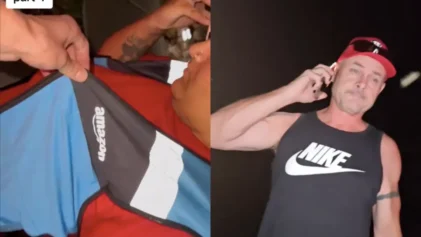
The Bruslie and Monroe cemeteries were uncovered during a 2013 survey of Shell’s property in Ascension Parish, La. (Photo by Travis Spradling)
Five years after the unmarked graves of nearly 1,000 enslaved Blacks were discovered near the Shell Covenant refinery in Ascension Parish, La., the corporation is moving forward with plans to honor these almost-forgotten people and their descendants.
In partnership with the River Road African American Museum, Shell is working to mark the two plantations where the graves were discovered in 2013, and will allow the descendants onto the property to pay their respects, the Advocate reported.
“I always knew there were cemeteries out there somewhere,” Kathe Hambrick, founder of the River Road African American Museum, said of what is believed to be one of the largest unknown burial grounds in the state.
“Having the plantation map in the museum and understanding there were as many as 100 plantations in Ascension Parish, I’ve always wondered, ‘Where were all those cemeteries for all those plantations?'” Hambrick added. “It has been brought to my attention that many of these cemeteries are now on property owned by industry.”
Thurston Hahn, an archaeologist with Coastal Environments Inc., uncovered the graves during the early phase of his company’s survey work for Shell amid plans to expand its refinery. That project has since been scrapped, according to the newspaper.
Hahn said he believed there could be unmarked graves under the outlined land after he spotted a particular symbol on an 1877 map near the area where one of two cemeteries were later discovered. There turned out to be close to 1,000 enslaved workers who were buried on the Bruslie and Monroe plantations, lands located just northwest of the refinery.
“We had a (ground penetrating radar) survey done back there that showed some anomalies that we couldn’t figure out what they were,” Hanh explained, noting that Shell then allowed his firm to bring in heavy machinery to remove 1½ feet from the top layer of the soil to see what exactly lay underneath.
What they found were burial shafts, of holes used to lower coffins into the ground. Their suspicions were confirmed, prompting Shell to halt its plans for expansion. Instead, the company partnered with the museum to determine how best to move forward after the shocking discovery.
On March 24, the Shell Covenant Refinery is slated to host a memorial service and marker dedication to the enslaved people buried on the two plantations, The Advocate reported.
“It became apparent that the project was the perfect fit and the appropriate thing to do based on our core value of respect for people,” Shell spokesperson Jordan Tremblay said.
Historical records show there are at least two more plantations on the sprawling 4,000 acres of property owned by the company in Ascension Parish.


